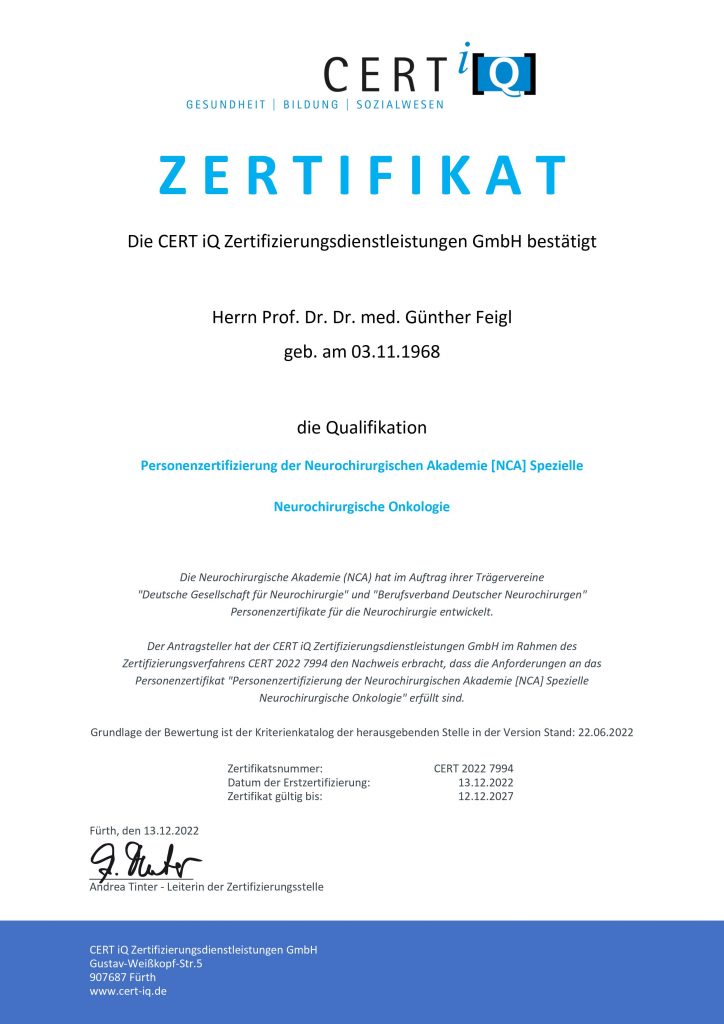Kategorie: Aktuelles
Neurosurgery Primary Faculty
As a member of the neurosurgery research team at Houston Methodist Hospital, I am proud to be part of this institution. In 2023, we completed ten thousand elective surgeries and secured 22.5 million dollars in research funding, including nearly 10 million from federal sources. I am pleased with the work of our team and confident that we will continue to make significant contributions to neurosurgery.
SUMMARY OF 2023 58 PRIMARY FACULTY. TEN THOUSAND ELECTIVE CASES (not a trauma center ) 22.5 RESEARCH FUNDING WITH JUST UNDER 10 MILLION FEDERAL FUNDING. CANNOT BE PROUDER OF MY SURGEONS, SCIENTISTS AND ADMINISTRATORS pic.twitter.com/wpjcpyhhWB
— Gavin W Britz (@gwb777) March 19, 2024
Qualitätssiegel für Schädelbasiszentrum Bamberg
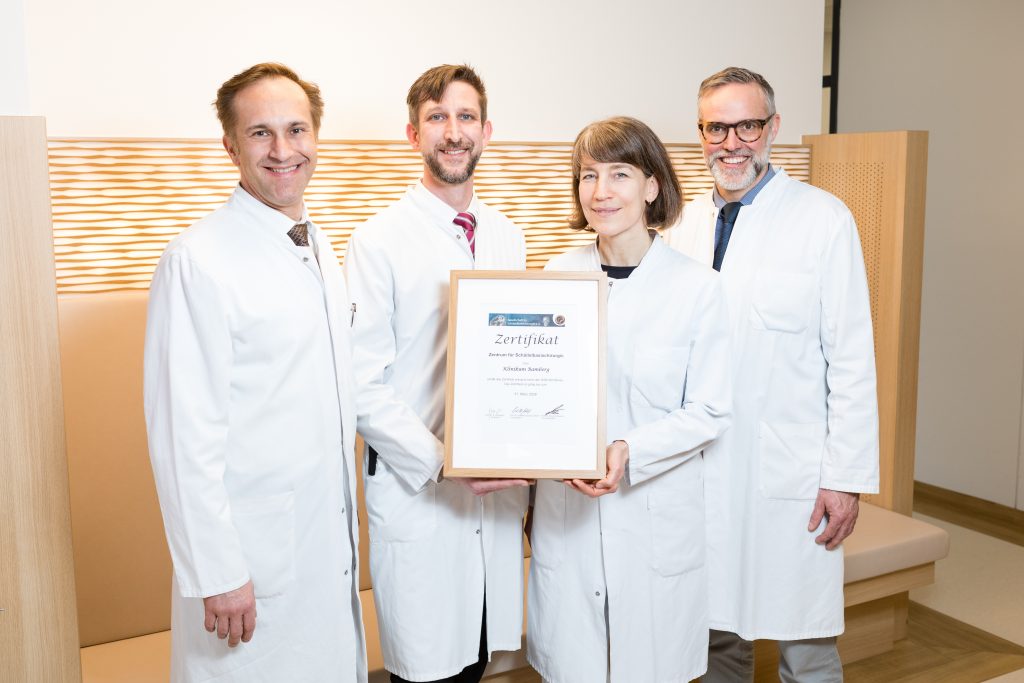
Erfolgreiche Bilanz nach 5 Jahren.
Das 2018 von Prof. Prof. h.c. Dr. Dr. med. Günther Feigl gegründete Schädelbasiszentrum Bamberg ist von der Deutschen Gesellschaft für Schädelbasischirurgie erfolgreich rezertifiziert worden. Damit zeichnet die Fachgesellschaft die jahrelange, erfolgreiche und enge Zusammenarbeit der Klinik für Neurochirurgie (Chefarzt Prof. Prof. h.c. Dr. Dr. med. Günther Feigl), der Klinik für Hals-, Nasen-, Ohrenheilkunde (Chefarzt Dr. Andreas Eckert) und des Mund-, Kiefer-Gesichtschirurgie MVZ (Dr. med. Dr. med. dent. Alexander von Moller) sowie Anbindungen der Neuro-radiologie, Strahlentherapie, Onkologie, Neuropathologie, Plastische Chirurgie und Ophthalmologie aus.
Im Schädelbasiszentrum werden vor allem Patient*innen mit gut- und bösartigen Tumoren an der Schädelbasis, aber auch mit Verletzungen, Entwicklungs-störungen, Missbildungen oder Entzündungen in diesem Bereich behandelt. Betroffene können in der wöchentlich stattfindenden Schädelbasis-Sprech-stunde vorstellig werden.
Erkrankungen und Verletzungen der Schädelbasis sind aufgrund der besonderen und sehr beengten anatomischen Verhältnisse und der darin verlaufenden Gefäße, Hirnnerven sowie der angrenzenden Strukturen wie dem Auge, dem Mund-Nasen-Rachenraum und dem Gehirn eine besondere chirurgische Herausforderung. Bereits präoperativ werden Patientenfälle interdisziplinär besprochen, um ein gemeinsames Behandlungskonzept aufzustellen, gefolgt von einer (gemeinsamen) Operation und einer interdisziplinären Nachbehandlung.
Die interdisziplinäre Einrichtung bietet neben einer modernen umfassenden Diagnostik eine leitliniengerechte, individuelle und patientenorientierte Therapie und eine optimale operative Versorgung.
Die Resektion der Tumore erfolgt minimalinvasiv und mikrochirurgisch unter Anwendung modernster technischer Ausstattung wie Endoskope, Mikroskope, Neuromonitoring, Navigation sowie fluoreszenzgestützter Resektionsverfahren.
Schädelbasiszentrum Bamberg
Prof. Prof. h.c. Dr. Dr. med. Günther Feigl
Telefon: 0951 503-12181
E-mail: neurochirurgie@sozialstiftung-bamberg.de
Basic courses in minimally invasive neurosurgery in 2024
We’re launching another course series focused on minimally invasive neurosurgery in the year to come!
State-of-the-art neurosurgery should be focused on minimally invasive procedures on the brain and spine. However, there are only very few neurosurgical departments that routinely perform such procedures. This is the reason why many residents and young attendings have little or no experience with minimally invasive neurosurgery.
The series consists of 3 hands-on dissection courses of which the first one focuses on approaches and procedures to the lumbar spine the second on the cervical spine and the third on the brain and skull base. The training will include lectures, virtual reality training, hands-on training on models and dissection training on cadavers.
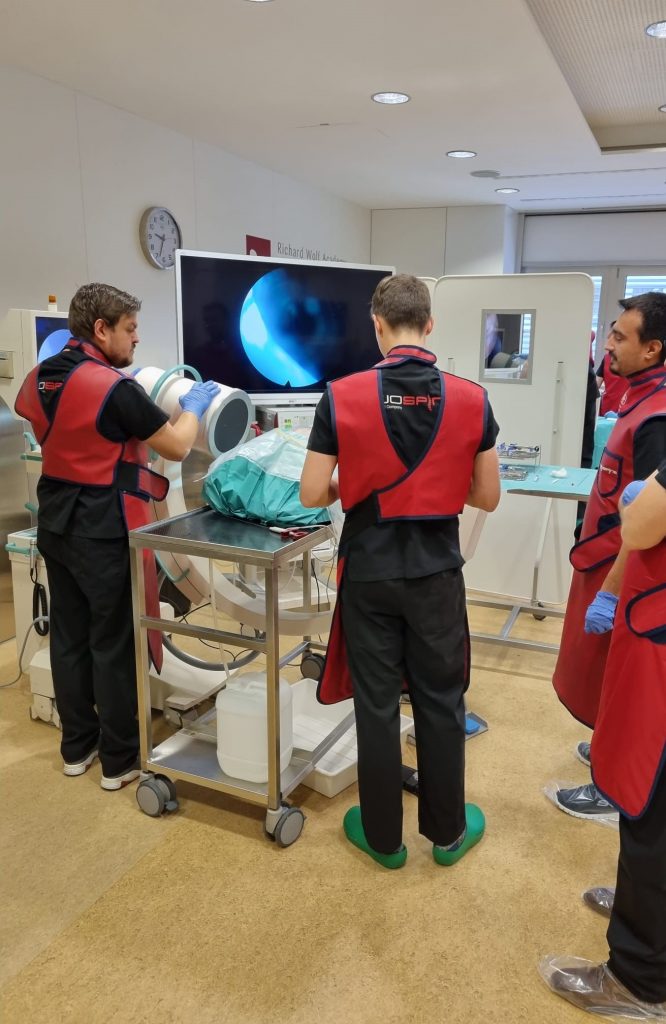
For more information visit https://zhc.hr/min/
Key Facts
Course 1
- Topic: Minimally invasive approaches to the lumbar spine
- Date: 15.-16.03.2024
- Max. number of participants per course: 14
- Registration Fee: 1.600,00€ (discount for registration for more than one course)
- Accomodation: Trg bana Josipa Jelačića 5, Zagreb
Course 2
- Topic: Minimally invasive approaches to the cervical spine
- Date: 06.-07.06.2024
- Max. number of participants per course: 14
- Registration Fee: 1.600,00€ (discount for registration for more than one course)
- Accomodation: Trg bana Josipa Jelačića 5, Zagreb
Course 3
- Topic: Minimally invasive approaches to the brain and skull base
- Date: 11.-12.10.2024
- Max. number of participants per course: 14
- Registration Fee: 1.600,00€ (discount for registration for more than one course)
- Accomodation: Trg bana Josipa Jelačića 5, Zagreb

Partnerschaft mit NEVRO
Das Zentrum für Neurochirurgie der Sozialstiftung Bamberg unter der Leitung von Prof. Dr. Dr. med. Günther Feigl und dem leitenden Oberarzt Dr. med. univ. Daniel Staribacher ist erfreut über die Partnerschaft mit der Firma Nevro. Durch die HFX Therapie konnte bereits mehreren Patienten mit chronischen Schmerzen erfolgreich geholfen werden!
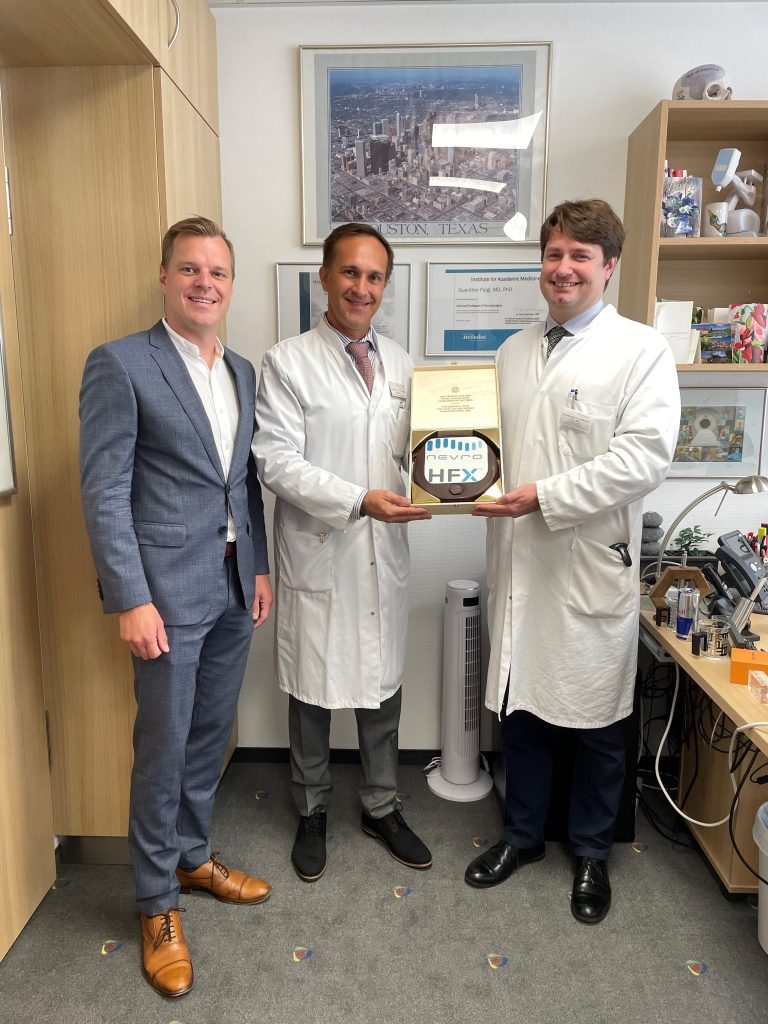
Courses in Minimally Invasive Neurosurgery
Next course coming up in October!
Key Facts
- Topic: Minimally invasive approaches to the brain and skull base
- Date: 20.-21.10.2023
- Max. number of participants per course: 14
- Registration Fee: 1.400,00€ (discount for registration for more than one course)
- Accomodation: Trg Nikole Šubića Zrinskog 1, Zagreb
More information at: https://zhc.hr/min/
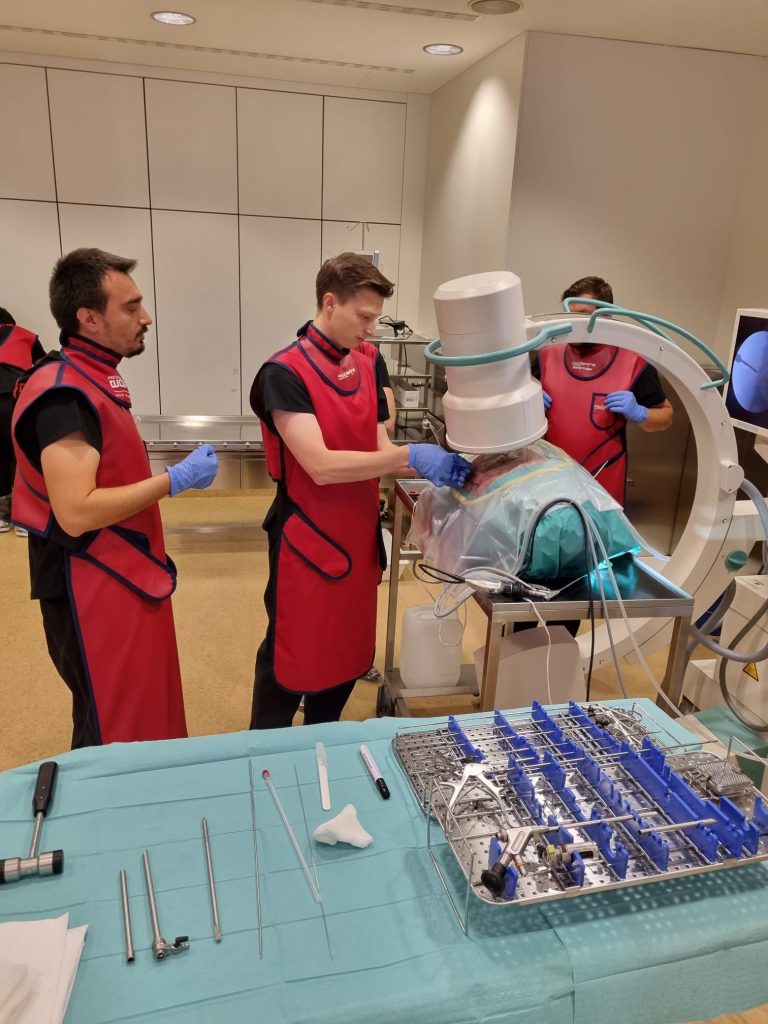

Stellenausschreibung Assistenzarzt
Wir suchen ab sofort eine/n neue/n MitarbeiterIn für die Vollzeitstelle Assistenzarzt in der Klinik für Neurochirurgie.

Werden Sie ein Teil von uns
Die Sozialstiftung Bamberg ist als Maximalversorger einer der größten Gesundheits- und Sozialdienstleister in Bayern. Wir haben einen gemeinnützigen Auftrag: Mit unseren medizinischen, therapeutischen, pflegerischen und betreuenden Angeboten sichern wir eine qualitativ hochwertige Versorgung der Menschen in der Region Bamberg.
In der Klinik für Neurochirurgie Bamberg wird das gesamte Spektrum der Neurochirurgie mit allen modernen technischen Verfahren für kraniale und spinale Eingriffe abgedeckt. Die Schwerpunkte der Klinik liegen in der minimalinvasiven Hirntumorchirurgie und Schädelbasischirurgie sowie in der operativen Therapie von degenerativen Wirbelsäulenerkrankungen und Schmerzsyndromen. Es besteht die volle Weiterbildungsermächtigung.
Die Sozialstiftung Bamberg bietet zahlreiche Möglichkeiten zur individuellen Entwicklung und Weiterbildung. Bamberg als UNESCO-Weltkulturerbe wird Sie durch sein breites kulturelles und gesellschaftliches Angebot und ein hohes Maß an Lebensqualität überzeugen. Weitere Informationen zur Stellenausschreibung finden Sie unten.
Wir freuen uns über Ihre Bewerbung!
#hiring #neurochirurgie #assistenzarzt #sozialstiftungbamberg
Go Gray in May
May was Brain Tumor Awareness Month.
Every year during this time, people from all over
the world are raising awareness about brain tumors
and their impact on patients and their families.
To help people better understand about brain tumors, we create videos that briefly explain the different subtypes in an understandable way – what it is and how it can be treated.
One type of brain tumor that we want to focus on is gliosarcoma. This brain tumor is especially rare and one of the more aggressive types. It affects the brain’s glial cells, which are responsible for supporting and protecting the brain’s neurons. For more information, you may view the video below.
We hope that this will help raise awareness about gliosarcomas and other types of brain tumors.
May was Brain Tumor Awareness Month.
Every year during this time, people from all over
the world are raising awareness about brain tumors and their impact on patients and their families.
To help people better understand about brain tumors, we create videos that briefly explain the different subtypes in an understandable way – what it is and how it can be treated.
One type of brain tumor that we want to focus on is gliosarcoma. This brain tumor is especially rare and one of the more aggressive types. It affects the brain’s glial cells, which are responsible for supporting and protecting the brain’s neurons. For more information, you may view the video below.
We hope that this will help raise awareness about gliosarcomas and other types of brain tumors.
Ehrenprofessur Verleihung
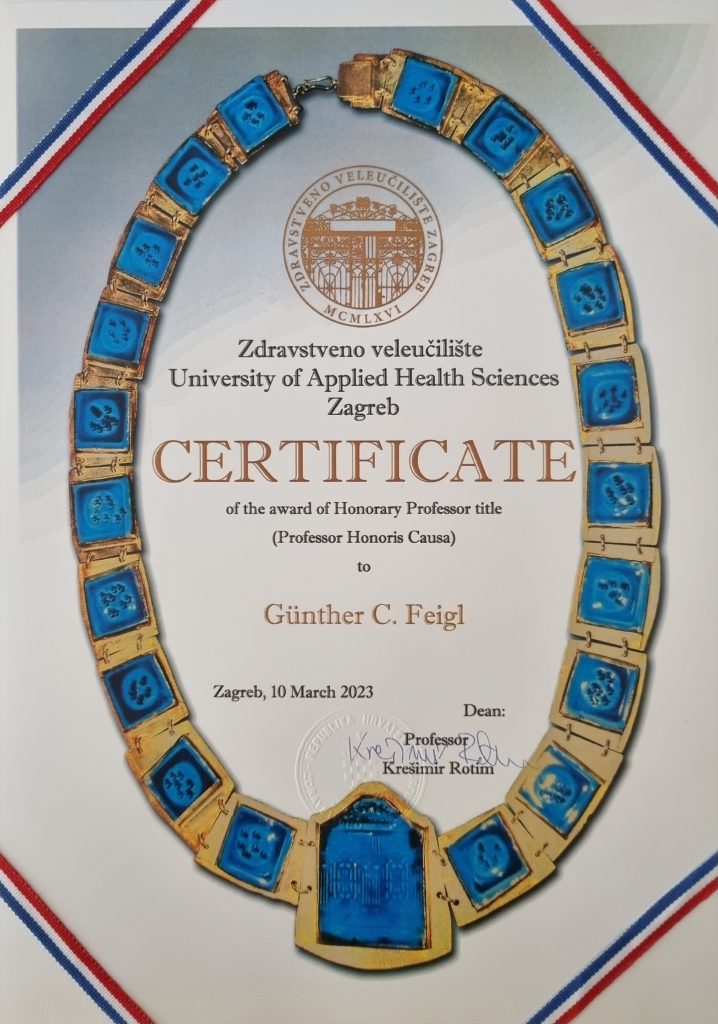
Chefarzt der Klinik für Neurochirurgie, Prof. Dr. Dr. med. Günther Feigl, hat am 10. März 2023 von der University of Applied Health Sciences in Zagreb den Titel Professor Honoris Causa verliehen bekommen.
Die Universität in Kroatien ehrt mit dieser Auszeichnung die fachliche Expertise von Prof. Feigl sowie seinen Einsatz für die Weiterentwicklung der akademischen Neurochirurgie auf höchstem Niveau –
in Krankenversorgung, Forschung und Lehre.
Personenzertifikat „Spezielle Neurochirurgische Onkologie“
Die Deutsche Gesellschaft für Neurochirurgie (DGNC) und der Berufsverband Deutscher Neurochirurgen (BDNC) haben Herrn Prof. Feigl erneut das Zertifikat „Spezielle Neurochirurgische Onkologie“ verliehen. Die NCA- Personenzertifizierung beinhaltet alle Qualifikationen, die OperateurInnen im Modul „Neuroonkologie“ der Deutschen Krebsgesellschaft (DKG) nachweisen müssen.

